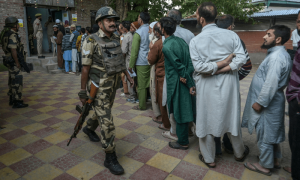An understanding of cultural diversity is an essential part of any child's education. It is necessary for a child to develop a broad perspective, and a healthy respect for the differences and similarities of the cultural, religious, economic and regional differences that surround him, or may, in the future, present themselves to him in various situations.
Looking at the current law and order situation in Pakistan, one does not find it surprising that Pakistanis, as a nation, are being libeled as pro-extremists. It is therefore with pleasure that one comes across organisations that are working hard at putting an end to the world-wide stereotyping of different sects of people in general.
International Education and Resource Network (iEARN) is one such organisation. Made up of over 25,000 schools in over 125 countries, iEARN is working on promoting acceptance and tolerance amongst an average of 2,000,000 students who engage in collaborative projects, worldwide, each day.
The iEARN centre in Pakistan provides several services to schools, teachers and students. Managing exchange programmes for youth and educators, it is one service that works towards promoting awareness of diversity that is severely needed in present times and conditions.
Muhammad Komail, currently an A-Level student, took part in iEARN's Youth Exchange and Study Programme (YES) after completing his eighth year at a matriculation school.
“The application process takes a whole year. Schools holding membership with iEARN are allowed to recommend their best students for this programme. These students are then required to fill various forms, pass interviews, sit through group discussions, and write essays in order to be cleared for the exchange programme. Top-notch grades are the first and foremost requirement for participation in YES. Other conditions include proficiency in spoken and written English, the student's confidence level, and how well he/she can adapt to different environments, and change in general.
“Once they are cleared in the application process, they are allowed to apply for the visa. Before the students leave, they have to attend a pre-departure orientation in which they are prepared for what they should expect on arriving in the US.
“I was to go to Pennsylvania, and attend Pennsylvania Solanco High School. My host family (a Caucasian family of four) treated me like one of their own. I had to do chores, mind my curfew, and keep my grades up. At school, the students and teachers were generally supportive and interested in my ethnic background. When, as a project for a school society, I was required to research the culture and religion of any country, I gave my presentation on Pakistan, and was greatly appreciated for it. I gave four similar presentations in the community ... it felt very fulfilling to know that I had succeeded in erasing even a little of the general stereotyping and ignorance that exists in the minds of Americans about us.”
When asked if he had faced any complications as a Muslim away from home, Komail confided that even though his host family, friends and teachers understood his obligations towards his religion, they did not understand his reservations about eating haram meat.
“There were no halal meat shops nearby, so I had to live like a vegetarian the whole time I was in the US, as I was adamant about not eating haram meat.”
Syeda Tayyaba Reza, currently a university student, who also took part in the YES programme on behalf of Shahwilayat Public School, says that any description of her stay in the US would be incomplete without a mention of her host family.
“My host mom, Bonnie Schutts, is divorced. I had two host sisters — Amy (now 23) and Kayla (now 14). My host family, and my fellow students and teachers at Menomonie High School, Wisconsin, respected my religion, culture, and country. Even if they thought of something as odd, they always made sure that I wasn't offended.
“It won't do justice if I don't mention Grandpa Lyle Christianson and Grandma Hellen Christianson, my host mom's parents. Grandpa learned the Urdu word nawasi (meaning maternal grand-daughter), and that's what he calls me ... such are the ties that we are meant to create in such programmes. When I think about the word 'family', I automatically think about them too.”
Students, as it turns out, are not the only ones who can take part in exchange programmes. The British School Link programme, established by the British Council, Pakistan, is one such project that allows contact between schools in Pakistan and the UK. A Pakistani teacher is invited to visit a British school, while a British teacher of the aforementioned school visits the Pakistani one.
The teachers and staff of both the schools work in liaison with each other, to help develop an appreciation of each others' societies in their students' minds. The teachers visit their partner schools to familiarise themselves with the other's teaching standards and practices, while the students send handmade gifts and souvenirs to each other. They are also encouraged to indulge in comparable activities and projects. According to Sir Marcus Gilbert, the director of the British Council, Karachi, the School Link programme is a venture towards better understanding between young people living in different parts of the world. As said in an interview conducted by students of a Pakistani school, Sir Gilbert emphasizes the need for such collaborations.
“What we try to do here is to promote mutual understanding, because most of the problems the world is facing nowadays are due to ignorance. People from one country don't really know what a person from another country is like. This is the reason why we want to encourage dialogue between young people.”
The Arts and Science Academy (ASA), Karachi, and Stoke Ash Community Primary School, Suffolk, are one of several partners that have flourished through the said programme. Mrs Mainaz Iqbal, the Academic Coordinator of ASA visited Stoke Ash in January 2008, where she was welcomed enthusiastically by the students and staff alike. Apart from imparting interesting facts about Pakistan to the students of Stoke Ash, Mrs Iqbal also distributed handmade cards, stuffed dolls and wooden spoon puppets dressed in traditional clothes, that the children of ASA had sent for the Stoke Ash students as presents.
“I was very impressed by the orderly system by which these children's education is carried out,” says Mrs Iqbal.
“The teachers have been provided with every facility they need, by the government, (such as computers, teaching material, projectors, etc.), in order to provide quality education to their students. The teachers themselves are trained, and have acquired proper education to be prepared for their profession. What amazed me most was that the students there, studying in the same grade, work at different levels according to their mental capabilities. Some children work independently, while others take help from their teachers. I have tried incorporating many of the superior teaching practices I saw at Stoke Ash, here in ASA.”
February 2009 saw the visit of Mrs Lisa Howard from Stoke Ash Primary to ASA. In her own words “I never really realised how much first person experiences can count until I arrived in Karachi. After all the negative imaging of Islam and Pakistan, I had been warned by friends and family against coming here. This is exactly why such programmes are so sorely needed — to erase pre-conceived ideologies, stereotyping, and racism.
“Understanding of other cultures is a vital part of a child's upbringing, and especially for students like those of Stoke Ash, who, having been brought up in a small village with no cultural diversities, possess no knowledge of the outside world.”
Mrs Howard showed unwonted interest in the cultural and religious activities of Pakistani Muslims. She visited an Islamic school and was quite surprised at how different Muslims were, in comparison to the image she had been forced to make up in her mind about them. She also made videos of things she found worthy of note (the process of salaat, for example), with the intention of showing them to her students at Stoke Ash.
Happy Home School (HHS), an establishment in operation since 1949, has been diligently incorporating the value of acceptance in its students. Their collaboration with the Karachi Japanese School (KJS) has flourished greatly in the past 15 years. Recently, the students and teachers of KJS visited HHS. After a general opening ceremony, the students of both the schools did clay work, murals, origami and pottery painting together.
Mrs Ghazala Nizami, the principal of HHS, reveals that she is very pleased at how well this relationship has prospered.
“What I am upset about is the thinning attendance at KJS. Currently, there are only seven students enrolled at the school. This may be because of the law and order situation of our country, but it is still encouraging to know that even though KJS's attendance has dwindled, their feelings towards us have not suffered in the least. We hope to extend similar friendly invitations to other consulate schools, in the near future.”
Asking whether the school had been involved in any other similar activities, Mrs Nizami informed me that recently, from June 19, 2008 to June 23, 2008, two of HHS's students — Zainab Faiza and Raed Zawawi — visited Pune, India, for a conference held to bring the young people of India and Pakistan together, and remove the age-long biases.
“There were originally 15 Pakistani children selected from different schools of Lahore and Karachi to visit Pune, but due to the non-availability of the Indian visa, they were unable to visit. Three children — Zainab Faiza and Raed Zawawi from HHS and Rahma Nizami from Convent of Jesus & Mary were able to visit the conference as their visas had been processed privately.”
Zainab Faiza had heartening details to give about her visit.
“This conference was an initiative taken by the students of two branches of the United World College (UWC); Marindra UWC, India, and Li Po Chun UWC, Hong Kong. The participants from India were very supportive of us. Geographical boundaries do not create distinctions.
“I did not expect them to be so understanding and friendly, with my head full of notions about Indians being our 'enemies'. But there I realised that they are exactly like us. They lead the same lifestyle, speak the same language, support the same dressing, and bear the same views about many things (such as respect, family values, upholding religious obligations, etc.). In just a matter of a few hours, we bonded as if we had known and liked each other since forever. Pune, to me, was like any another city in Pakistan. It was, beyond doubt, the greatest experience for me, and a certain eye-opener.”
Media plays an immense role in planting convictions in the minds of people. News channels, especially, portray incidents and images in such exaggeration, that it gives considerable way to racism, prejudice and narrow mindedness. This is not to say that all media is subjective.
However, there are comparatively fewer instances where they move towards erasing pre-conceived biases. It is a comfort to know, thus, that initiatives are being taken by our schools to teach the students the value of tolerance, the meaning of peaceful existence.
After all, we do not need the likes of the holocaust, the Hiroshima and Nagasaki bombings, and the innumerable other inhumane incidents, however small, that are backed by racial prejudice, on our hands again ... and educating our youth along these lines means humanising our future.












































Dear visitor, the comments section is undergoing an overhaul and will return soon.